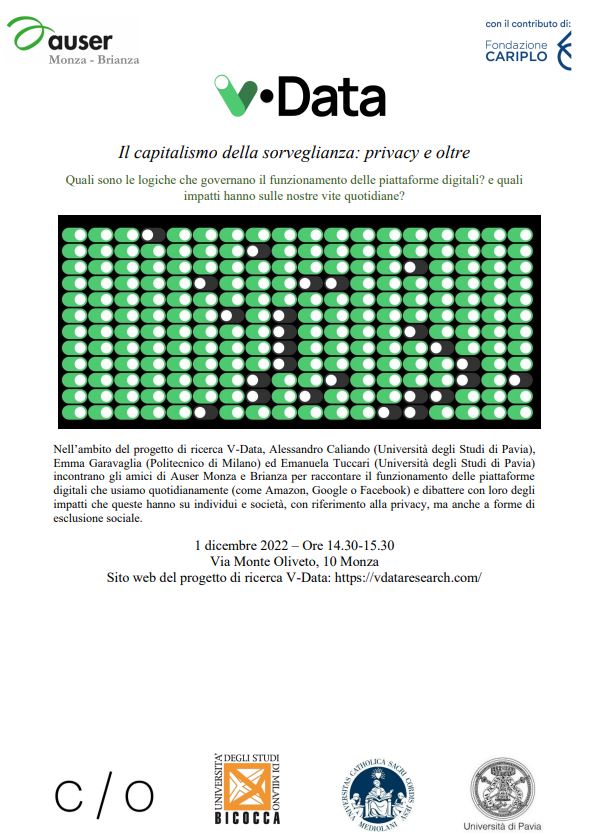Surveillance capitalism, social exclusion and discrimination
Description
We will conduct a desk research in order to identify and analyse already existing initiatives of data activism, specifically addressed to prevent and tackle social exclusion and discrimination in digital data extraction and exploitation. We will conduct 4 brainstorming sessions involving at least 6 key informants each, in order to explore the risks of social exclusion and discrimination stemming from processes of digital data extraction and exploitation. Key informants will be selected among experts and activists in the fields of diversity and inclusion, digital divide and digital inequalities, data justice. We will analyze data from brainstorming through a process of open and axial coding. Drawing upon the research findings, we will elaborate recommendations (white paper) to prevent and address risks of exclusion and discrimination in digital data extraction and exploitation in Italy.
Goals
- to explore the risks of social exclusion and discrimination stemming from processes of digital data extraction and exploitation, in Italy
- to elaborate recommendations to prevent exclusion and discrimination in digital data extraction and exploitation (addressed to the Italian context, but transferrable to Europe)
Team member
Outputs
document
Italian experts’ perspective on social justice issues linked to surveillance capitalism practices

Introduction
In an economy predominantly driven by the exploitation of information sources, such as surveillance capitalism, power is in the hands of those who can manage this information. Therefore, the whole system relies on the unbalance between those subjected to exploitation and those who manage the data: this unbalance potentially creates or perpetuates social injustice. Among the most extensively researched disparities within surveillance capitalism are related to privacy issues. However, there are other serious potential social harms associated with the conventional practices of surveillance capitalism. For instance, scholars have begun to examine potential discriminatory and exclusionary threats that may arise due to the extensive utilization of data, but this area of study still requires significant development. Our study aims at contributing to the reflection on social justice issues related to surveillance capitalism practices, other than privacy. We focus on the Italian context, still an understudied case. The study has so far entailed the organization of 3 online focus groups (March and April 2023) with 11 total participants (both digital activists and experts). The main themes for discussion proposed in the sessions were the following: social injustice linked to surveillance capitalism processes; specific social, cultural or economic characteristics of the Italian context in relation to the theme; resistance practices in the Italian context.
The research question guiding our work is: Which are the specificities of the Italian context that can constitute a breeding ground for the potential harms deriving from surveillance capitalism practices?
Insights derived from our conversations with activists and experts show that, at the moment, Italy is far from having the conditions allowing to prevent and contrast the possible harms of surveillance capitalism processes. The themes around which the participants’ narration about this general issue has focused are now discussed more in detail. Overall, it is interesting to note that the aspects emerged and discussed during focus groups are not specifically linked to the economic aspects of surveillance capitalism (i.e.: the appropriation of economic value, without redistribution): these aspects seem much more invisible and difficult to ‘visualize’ and ‘verbalize’ even for experts.
Theme 1 - Lack of awareness and debate
Participants lamented the absence of informed, specialized and professional public and political debate on the topic of surveillance capitalism and its potential harms: Whenever European privacy issues came up, or for example we make a big petition, we make a European campaign on this issue, on illicit data collection, the Italian team always said: no, in Italy they don’t give a shit to anyone. We don’t do these campaigns. We tried, but no one signed it, it was a matter not heard, not relevant.
The complete lack of a shared discussion, involving various kinds of institutions and citizens, about issues of social injustice related to the collection and use of personal data by digital platforms – and actually, more in general, about surveillance capitalism – is considered an important obstacle to the capacity of preventing and contrasting existing risks.
It is interesting to notice that, even experts participating to our focus groups, more readily refer to the concept of privacy when discussing harms of surveillance capitalism.
Furthermore, participants recognised scarce digital literacy within the population (in general, and especially among certain groups – e.g. low educated groups) and linked this to a reduced awareness about the potential harms of surveillance capitalism in terms of social injustice: Specifically, to the Italian case there is no algorithmic awareness and awareness of the platforms, in the sense that even when we talk about online violence, but any other online phenomenon, there is no awareness of the mediation that takes place through the platform, so we tend to talk about these phenomena as if they were equal to those that occur in offline environments.
Last, but not least, participants recognised a general collusion of Italian citizens with surveillance practices acted by private digital platforms versus a tendency to consider unacceptable surveillance through digital devices acted by the State: This is an ideological issue: I trust Facebook to take my data, but I don’t trust the state to take my data. This was even more manifest, with some digital entrepreneurs, startuppers, people who should have some data awareness… they impersonate anarcho-liberal ideology, and this was consonant with the whole part, no vax, no greenpass, triggered by anti-State feelings.
Themes 2 - Homophobia, racism, sexism
A second key issue emerged from the discussion about the potential harms of surveillance capitalism processes in terms of social injustice is related to harmful online behaviors directed towards vulnerable groups. Participants’ narration tended to link them to a (offline) culture still permeated by homophobia, racism and sexism and a context in which an adequate institutional presence and action, both in terms of prevention and support to the victims is still lacking: If we look at the Italian political culture, there are some peculiarities that then reproduce in the way technology is imagined and innovation is how resistance is imagined. In my opinion, at the level of the citizen and consequently of the media, there is already a low sensitivity towards discrimination, human rights, Italy always lags a little behind. […] lot of people do things on Internet because they think they’ll go unpunished. In Italy we have this vision: I can do what I want on Internet. Not only against others, but also about myself
Theme 3 – “Traditional” technology culture
A third question around which participants’ discussions converged regards the technological culture typical of our Country. The Italian context seems to be characterized by a cult of technological innovation for entrepreneurial progress. In a system made by small and medium enterprises the discussion around technological innovation tends to be monopolized by a positive vision that relates it to economic progress. Any critical reflection on issues of digitalization, technology, innovation tends to be seen as an obstacle to the opportunity for Italy to (finally) catching up with what most advanced economic systems are doing: In Italy we have the fear of lagging behind in the field of technology, so anything that can block innovation can be seen badly. When the Garante della Privacy says something, then everyone reacts “eh but then we cannot do anything”, small businesses, e-commerce, because we already feel like we have fallen behind, so if something blocks us it seems that it is something that penalizes us.
Moreover, if technology and technological innovation are often discussed in relation to economic growth, the potential of innovation – and specifically of big data – for social good is very rarely debated in public and political contexts: It’s difficult to have intercommunication and therefore connection between the various databases, which, in my opinion, it is a fundamental thing because on the one hand it is risky, but on the other it is powerful because if we have a public monitoring of the health connections of citizens we can see when circumstances happen. Classic example: Taranto. How many cancers there are, how much pollution? What big companies do: predict what is a trend. The public should do this, talking about territorial health.
| Themes | Keywords |
|---|---|
| Lack of awareness and debate | Public debate Political debate Scientific knowledge Digital literacy Awareness |
| Homophobia, racism, sexism | Culture Vulnerable groups Institutions Prevention Protection |
| Traditional technology culture | SMEs Innovation Technological culture Public goods |
A research project by:



Funded by:

Contact us:
Drop a message to alessandro.caliandro@unipv.it - twitter - facebook - researchgate









